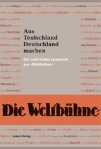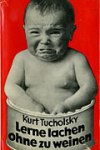Recently, in a public meeting in Paris, which was incidentally very German-friendly, one of the speakers said something really charming, of which I made a note. He spoke about what Germans are like, analyzed them not without skill, and then said, just incidentally, “Germans are like the model pupil.” If the Leipziger Neuesten Nachrichten hadn’t forbidden it, I would have cheered.
Category Archives: 1925
A Boy in My Class (Ein Kind aus meiner Klasse)
For Hans M.
I recently ran into a boy from my school class, after so many years. It was just like in a storybook. The poor man was standing outside the fence, begging, and the rich man was inside, brushing the cake crumbs from his jacket. “Don’t you recognize me?“ asked the poor man, gently. And then the rich man recognized his former class-mate, and… I can’t remember how the story ends. Anyway, the boy from my school class, with whom I used to walk around the school playground in deep discussions, has become a government councillor. I probably won’t achieve anything respectable during my lifetime, either. And I have my doubts about afterwards as well.
The Case Against Immortality (Plädoyer gegen die Unsterblichkeit)
The unshakeable faith with which every writer assumes they will make an impact on posterity, is very touching. Their feet wade through muddy puddles, but their eyes gaze, calf-like, at the stars of a new age.
The Patriotic Associations (Die Vaterländischen Verbände)
Notes on Gas Warfare (Bemerkungen: Der Gaskrieg)
By Lothar Engelbert Schücking
What the pacifists have found out about gas warfare have really shaken our military to the bones, in particular the general staff, who have just started to realize that in the next war it will no longer be possible to distinguish between the historical nobility in their high quarters behind the lines, and the common cannon fodder. Gas warfare makes the whole thing more democratic, and is just as dangerous to the civilians well behind the front as it is to the fighting soldiers. There is no front any more, no deployment, not even really a mobilization. Each country wipes out the life of the other, root and branch, from the air, in a few days.
The Telegram Pad (Der Telegrammblock)
In front of me lies a pile of sheets of paper between two pieces of cardboard, tied up in a strange way, by the kind of thick iron wire on soldiers’ mess kit, instead of normal book-binding thread.
The Blade (Die Klinge)
Posterity weaves even less wreaths for journalists than for actors, of whom at least the role models mean something to citizens of later centuries. He has to let himself be carried by the day, be in harmony with its rhythm, and strangle his mount, like Freiligrath’s desert king, when the new day dawns in the East. Woe betide him if he falls in love with one day, he would quickly find himself behind a thousand others. The journalist, as a critic of his times, does not write himself into the book of history, he writes himself under his opponents’ skin. Their scars are his fame. His personal records are scratched in their skin; you can read the man and his works there, as if from paper. The day passes, with its mixture of excitement and routine. Daggers and scars remain. If you are talking about journalists, the question is soon not, „What does he stand for?“, but rather, “What has he dished out, how does he stand up for himself?”




